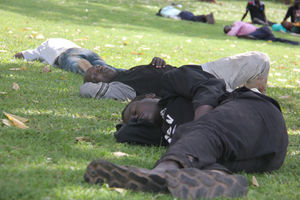
Mr Daniel K. Kalinaki
One of the remarkable things about the countries that colonised others the most in the last 400 years was how small they are. Portugal, one of the trailblazers, is two-and-a-half times smaller than Great Britain, which, given that the latter is around the size of Uganda, is very small.
Spain is about two times the size of Uganda, and slightly smaller than France, but these are largely the exceptions among the European colonial powers. You can fit five Netherlands within Uganda’s tiny boundaries and have room to spare, while Belgium is about 80 times smaller than the Democratic Republic of Congo, which it colonised.
Size, of course, is not everything. You need the ability to defend territory, which requires close collaboration among the inhabitants. The continuing instability in DR Congo, the division into two of the Sudan, and the continuing conflagration in what’s left of its northern bits are proof, if any was needed, of this point.
There were many reasons why these smaller nation-states were able to take on, defeat and colonise much bigger geographies. Technology, for instance, including shipbuilding, gunpowder and the Maxim gun was a force multiplier, for sure. We can add capitalism’s red-clawed demand for slaves to power the New World plantations, low immunity to Old World diseases, and the terrible climate in some of the colonising countries as having combined to ensure success.
But we must never forget the key decisive role of internal collaborators. Some were far-flung tribes and tribe leaders who thought that raiding their neighbours for slaves would give them upside on the trades, or weaken rivals to allow them to take over their grazing lands and women. Incidentally, this value chain only worked until the other tribes had lost their able-bodied menfolk, at which point the collaborators were often pressed into the boats themselves.
The more destructive collaborators, however, were those from within the tribe, and often within the palace itself. They lay awake in their huts at night thinking of the mirrors and trinkets that the king had received from the Arab or White visitors and wondered why they did not have their own. They, after all, were the advisors full of insights and wisdom. The king was only a violent accident of birth. The coloniser, regardless of whence they came, already understood human nature and its three driving forces of hope, greed, and fear. Once welcomed into the kingdom, all they had to do was to identify the influential individuals and constituencies and which incentives applied to them. The hardest bit was always how to couch the final betrayal as a progressive act for the tribe and the kingdom so that the new world order was more acceptable and even warmly welcomed by the masses. Here religion often provided a warm lubricant, although more extreme measures, including punitive expeditions that ended in the killing or exiling of the old monarch, sometimes had to be imposed.
Whatever the means, the end was the same: by the time the sun rose after the night of the long knives, a new category of social climbers had emerged with newfound wealth, power and a progressive narrative of reform.
Students of history will find eerie similarities between the divide-and-rule tactics that paved the way for the installation of colonial rule and the on-going shaking of gourds and rattling of beads between the Central government and Buganda Kingdom.
This isn’t a new contest, mind you, but it isn’t any less fascinating. Attempts to prop up splinter chiefs and chiefdoms culminated in the Kayunga Riots of 2009 in which dozens of people were shot dead, in most cases at close range. They continued, in a somewhat boring but no less insidious manner, through an effort to trigger a peasant revolution against the landed gentry and absentee landlords (some of whom, it must be said, are descendants of the first cohort of collaborators now being forced to drink from the same chalice of dispossession).
The fighting now appears to be approaching the palace gates. A piece of land very close to the palace has been appropriated for the chiefs, presumably so that they can also build their own palace near that of the king. Why chiefs need a palace, and so close to that of the king beats me. One hopes that it is to ensure timely communication, although one fears that “please find attached” might reference missiles, verbal and otherwise, fired over the two fences.
Emboldened, the chiefs these days saunter in and out of the Governor’s mansion without the say-so of the king. And when the king retreated to a summer camp in foreign lands to recuperate, the chiefs insisted, with financial support from the Governor, on going to visit with him, apparently against the desires of the royal court! The fortunes of Uganda’s governments, right from the colonial days to the present, have flourished or floundered depending on the relationship with Buganda Kingdom. The current phase of the contest looks like an escalation that will have far-reaching consequences.
As we watch it unfold, we are reminded, not of the Lord’s Prayer, but of the Gangster’s Plea: Dear Lord, please protect me from my friends; my enemies I can take care of myself!
Mr Kalinaki is a journalist and poor man’s freedom fighter.
[email protected]; @Kalinaki


